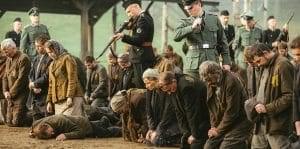
A Soviet soldier organizes a revolt of the Sobibór extermination camp during WWII.
As a Russian myself, I can testify to how passionately and bitter my people feel about WWII. Russians played a pivotal role in winning the war, yet our complicated story is rarely told Stateside without a healthy dose of bias. Hollywood prefers to focus on the US involvement instead; exceptions are few and far between (Sam Peckinpah’s Cross of Iron and Jean-Jacques Annaud’s Enemy at the Gates are two decent ones that come to mind). One would have to turn to Russian cinema to experience our perspective, with Elem Klimov’s masterpiece Come and See arguably being the most accurate and unflinching display of war to ever grace celluloid.
Now prolific Russian actor-turned-director Konstantin Khabenskiy (known in the US primarily for Timur Bekmambetov’s wacked-out Night Watch series) decides to rectify the issue by helming a big-budget, wildly sentimentalized account of the Sobibor concentration camp uprising. I guess he hoped to educate a broader, global audience; whether it works remains to be seen (the film is currently a blockbuster in Russia). Despite its gratuitous nature, hilariously-dubbed and subtitled dialogue, and redundant love story subplot, Sobibor works on many other levels. It’s suspenseful and resonant, with an epic feel undeterred by its claustrophobic setting. Its lead also goes a long way in anchoring the non-stop assault of gut-wrenching proceedings with his humanity.

“…decides to rectify the issue by helming a big-budget, wildly sentimentalized account of the Sobibor concentration camp uprising.”
Split into 13 days, Sobibor’s narrative gradually accumulates momentum, its final – and best – third reaching the zenith of intensity. From the first sequence, wherein a decrepit string quartet “welcomes” prisoners at the sordid Sobibor train station, Khabenskiy lets us know what to expect. The dreadful, grey camp is run by the merciless Karl Frenzel (Christopher Lambert), a possibly bi-polar Nazi with daddy issues. Khabenskiy splits the narrative into several threads – evil Nazis, a crew of jewelers, a young woman who hides things in her bra, a boy with an affinity for horses – placing himself at the center as the humble-but-heroic commander Alexander Pechersky, who drops his pants when his ethnicity is scrutinized.
Having witnessed the horrors of battle in Minsk, Alexander seems surrendered, until his comrades inspire him to plan a rebellion. “We need a Moses,” his friend says encouragingly. As the Red Army – and salvation – approaches, the camp comes under threat of being liquidated. All the threads intertwine, with Alexander hatching a plan to kill Sobibor’s “brain,” by having his gang lure Nazi officers into traps.
Khabenskiy certainly doesn’t shy away from graphic displays of human misery and pain. Stripped-down women are led into a gas chamber and casually observed as they suffocate. A child gets shot in the back during an unsuccessful escape attempt; consequently, “every tenth Jew” is murdered as punishment. A man is brutally lashed for refusing to drink cognac. Prisoners empty out a train filled to the brink with corpses. A party involves human beings ridden and shot like horses, as well as burnt alive. A man’s face gets bashed in with the back of an ax. I think you get my point.

“…serves as a powerful reminder that the nation, so ostracized by the US these days, has plenty of heroes of its own.”
Gratuitous and repetitive? Sure, but the filmmaker adds enough passion and verisimilitude to keep us engaged. Alexander’s severely underdeveloped relationship with a righteous young woman takes away some of the grit (“All of this, the death camp, was to find you,” Alexander proclaims to her… like, really?), but the rest, for the most part, is well-orchestrated by Khabenskiy.
A superstar in Russia, Khabenskiy-the-actor sidesteps overt heroism and/or glamorization with a humble, yet piercing portrait of the real Alexander Pechersky. Though he’s listed first in the credits, Konstantin wisely steps to the side, letting his peers have moments to shine. Then there’s Christopher Lambert. Similarly to how David Hasselhof’s weirdly popular in Germany, for some reason Lambert happens to be an icon in Russia (Highlander clearly resonated in the post-Perestroika nation). I’d call his performance as the vehement, crazed Frenzel impressive if it weren’t for the dubbed lines which kept throwing me off – and issue prevalent in a film that can’t seem to decide who is speaking which language.
Sobibor may not fully do justice to the Russians’ involvement in WWII, yet it certainly serves as a powerful reminder that the nation, so ostracized by the US these days, has plenty of heroes of its own. Hopefully, it makes enough of a dent Stateside to help the less-aware think outside the box.

Sobibor (2019) Directed by Konstantin Khabenskiy. Starring Konstantin Khabenskiy, Christopher Lambert, Mariya Kozhevnikova, Michalina Olszanska, Philippe Reinhardt.
7 out of 10



A very good review, you’re spot on. For sure worth the watch!
Terrific review! Though the movie is one of the hardest watches – it is very timely